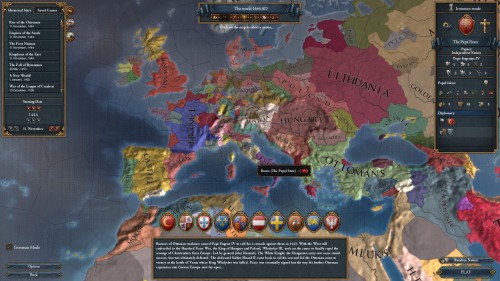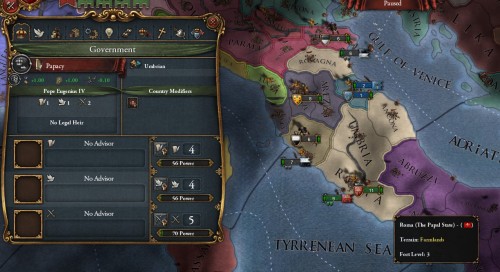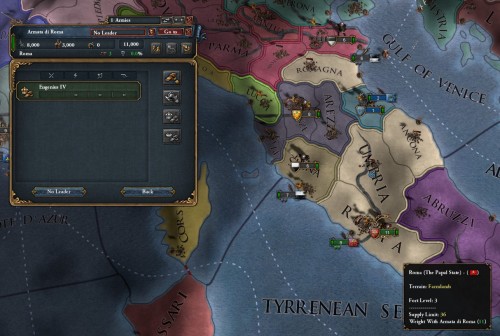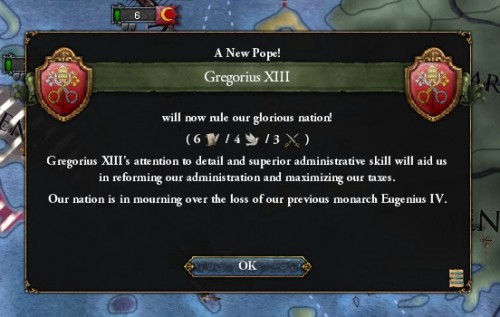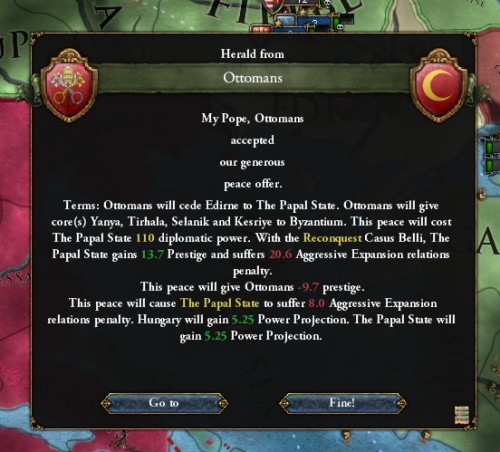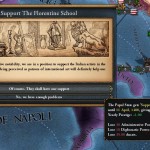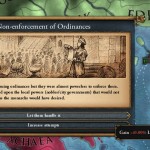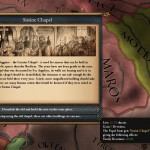Having just giving the Papal States a test-drive in Europa Universalis this weekend, I’ve decided to give it a proper play-through and report on my progress, challenges, and setbacks. First, some background:
The Papal States represents the temporal authority of the Holy See. As such, certain options aren’t directly available for somebody playing as the Pope. For one, you’re stuck as a theocracy. This means no royal marriages for diplomatic purposes, but it also means there’s no worrying about your ruler dying without an heir; there’s always somebody lined up to pick up the banner as Bishop of Rome. Also it looks like the Papal government form can never promote itself to Empire status.
The starting position of the Papal States is reasonably strong but without a safe means of early expansion. Four central Italian provinces that are well-developed, good early-game manpower for such a small state, excellent tax revenue, and a single-province vassal ready to use as a buffer for overextension are all in the plus column. There’s also Avignon, but that’s mostly just a magnet for trouble with France, Burgundy, and Provence. In the minus column you’ve got the neighbors. Several small-to-middling Northern Italian states look ripe for the picking, but they’re all in the Holy Roman Empire but the Pope isn’t. Attacking Siena or Lucca on day one before they have any allies would be awfully tempting if they didn’t get the automatic assistance of the sitting Emperor. To the South lies Naples, encompassing the whole South of Italy and sitting pretty as the minor partner in a Personal Union with Aragon. Aragon has a much more impressive navy and army than the Pope, and frequently makes friends with Spain, France, Burgundy, or even Austria, none of whom are safe to dance with when you’ve got four Italian provinces and little tiny vassal. Reasonably nearby but not neighboring directly is Venice. Venice has a clutch of vassals, tends to make friends with at least one major regional player, and can generally be counted on to have a strong navy. There’s also the Holy Father himself to look at. Pope Eugenius IV is not a towering pillar of personal effectiveness.
My early-game strategy is going to take all of this into consideration and make friends with my obvious enemies. On day one try to ally with Aragon and Venice, plus possibly Austria or Hungary. Aragon and Venice are important for the naval assistance they can provide, and will probably both be necessary. Austria has excellent manpower as the starting Holy Roman Emperor and making friends with the emperor will open the door to HRE membership and North Italian conquest with fewer strings attached. Hungary is a poor second-choice to Austria; they’ve got he manpower but not the connections. Of course, Austria tends to drag its allies into a bunch of pointless wars against big players, so they’re not automatically the go-to manpower-provider. But what to do with two moderate naval powers and a big army? Jump on Byzantium, of course!
The City of the World’s Desire is what they call Constantinople, but mostly it’s the city the Ottomans desire. By subjugating the Byzantines any country can get itself an early-game vassal that has several coastal cores currently held by the Ottoman Empire in 1444. Get the Byzantines in-hand, integrate Urbino to free up a diplomatic relationship, and pick fights with the Ottomans using mercenaries and allied manpower to keep war exhaustion down, and by 1500 the Pope should have Greece and parts of Asia Minor all sewn up. Integrate the Byzantines diplomatically and there you go, a Papal State with some legs. And really good flatbread.
Mid-game things will rely a fair bit on some unique features the Papal State can call on. Its national ideas grant it extra tax revenue and extra religious stability. From what I’ve seen of its events (the Sistine Chapel, the Vatican Library, St. Peter’s Basilica, etc.) there are ample opportunities to gain a continuous stream of Prestige and Devotion. For idea groups I’ll start with Diplomacy, then move on to Aristocratic, then possibly Administrative. Each of these have a cap feature that reduces technology costs by 10% for Diplomacy, Military, and Administrative respectively. With lowered technology costs it should be somewhat easier to keep stability positive, develop provinces, and hire competent military leaders.
Let’s get thing running with the brief reign of his most holy Pope Eugenius IV, starting in November of the year of our Lord 1444.
In the Papal War of Aggression against Byzantium the Vicar of Christ Pope Eugenius IV found his true calling as an able leader of soldiers at war. He would lead the Armata di Roma through the course of every battle and siege, never losing an engagement. Sadly it was not God’s will that he should live to see the peace his efforts would eventually forge. Venice had most-unreasonably declared the Papal State as her rival and as such was unavailable as a military ally. Aragon, Austria, and Hungary remained true to their faith and immediately agreed to treaties of mutual friendship and support-in-arms. Having secured stout allies, Eugenius immediately declared a war of subjugation against Byzantium with no formal casus belli. Rome’s fleets set forth immediately to Achea. Reinforcements from Naples, Aragon, and Hungary arrived shortly thereafter. Eugenius set his sights on the castle at Morea, laying siege for several months while his allies cleared out the sea lanes of Byzantine galleys. The Greeks put up a valiant defense of Constantinople and were swept aside. The great city fell in short order, but due to a misunderstanding, miscue, or miscommunication it was the forces of Aragon that claimed the province, complicating the peace negotiations somewhat. The Byzantines and their vassal Athens were vanquished, but could not be made subject to Rome while Aragon held their capital. On February 23 1448, still encamped with the Armata di Roma outside the freshly-surrendered Constantinople, Pope Eugenius IV contemplated his options in prayer. He left detailed instructions to his subordinates and passed on from the mortal world. And so it was that even as Rome celebrated her victory she mourned her warrior Pope and welcomed a remarkable new leader.
Pope Gregorius XIII was particularly well-suited to pick up where Eugenius left off, shepherding the spiritual and temporal church into the beginning of a new era of influence. In his first act, Gregorius concluded the peace of 1448, granting Aragon the city of Constantinople and reserving Achea, Morea, and Athens for the Papal State. He immediately demonstrated the virtues of charity and mercy upon his new subjects by releasing them as a single vassal. Having acquired a valuable territory through the Pope’s generosity, Aragon immediately broke her alliance with the Papal State. Gregorius predicted this would likely result in terrible conflict in the future, but time would tell. He set about consolidating his holdings and preparing for a truce with the Ottomans to expire, as they were embroiled in multiple simultaneous wars and Byzantium was eager to recover lost territory. The 1450’s would have a terrible start for the Ottoman Turks. Crimea had dragged them into war with Venice and Genoa. Muslim neighbors harried their Eastern borders. Then Pope Gregorius deemed it was time to press Byzantium’s claims to Greek lands. Again Hungary answered the call, bringing its army down like a hammer through the Bulgarian frontier while Roman and Greek forces swung up through Thessaly. The Ottoman forces had too many threats from too many directions, and were soon completely swept from their European holdings. In 1454 Byzantium was made whole and the Turks were driven from their own capitol of Edirne, which was taken by Rome and sold back to Byzantium a day later for zero ducats.
On the domestic front, Pope Gregorius faced many decisions with wisdom and grace. He permitted the local government in Romagna to handle the non-enforcement of ordinances issue, showing a willingness to tolerate a high degree of local autonomy. He commissioned the reconstruction of the Sistine Chapel, a decision that will likely set off a long-lasting chain of events for the greater glory of God on Earth as well as in Heaven. He also established the creation of a General Hospital, which will greatly benefit the faithful and permit even more healthy young souls to serve under arms for centuries to come. Shortly after the war to restore Byzantine lands from the Ottomans concluded, the Papal State began the diplomatic process of integrating Urbino. Pope Gregorius XIII began his tenure at the sunset of war, he lead through war and peace for seven years, and he passed on to his eternal reward on July 4th, 1455.
Our next installment will start with the troubled reign of Pope Pius II, a far less capable man than his predecessor.
